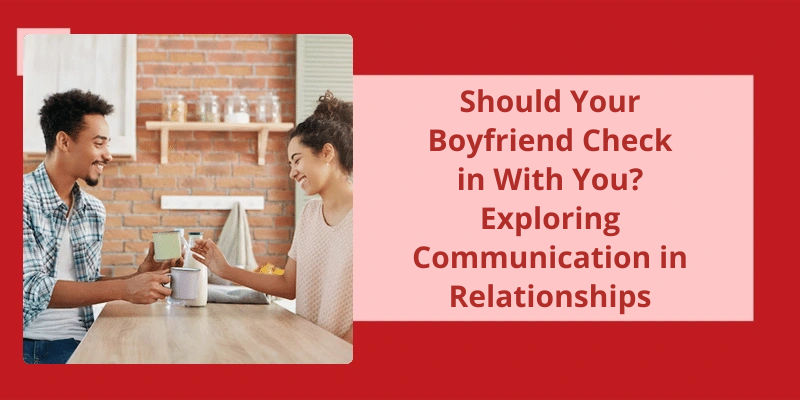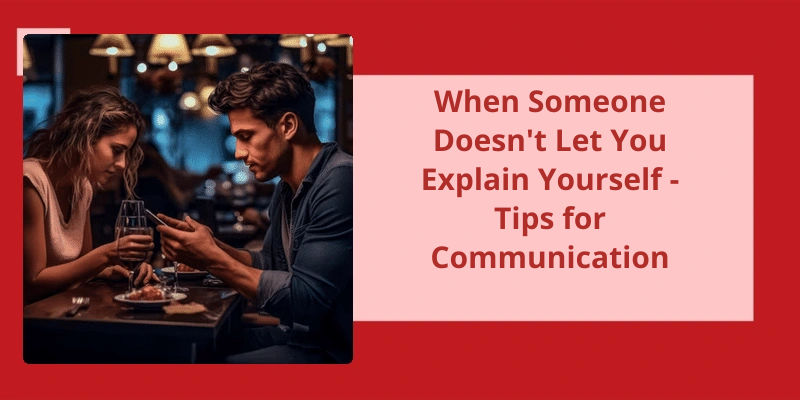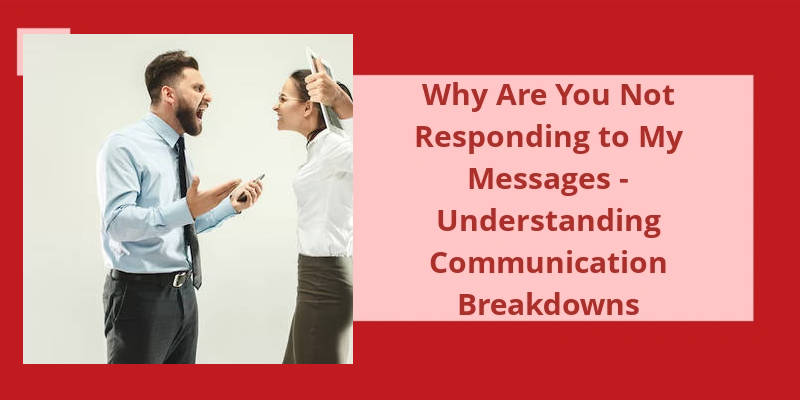We all value our personal space and alone time, and constantly being bombarded with messages can be exhausting. To maintain a healthy and balanced relationship, it’s crucial to set clear boundaries and communicate effectively with your friend. While it might feel uncomfortable, it’s essential to have an open and honest conversation to let your friend know that their excessive texting is becoming too much for you to handle. Express the importance of personal space and the need for occasional solitude. By setting clear expectations and limits, you can encourage your friend to respect your boundaries and reduce their excessive texting habit. Remember, it's okay to prioritize your mental and emotional well-being, and sometimes saying "no" is necessary for maintaining a harmonious friendship.
How Do You Text Without Being Clingy?
When it comes to texting, it’s important to strike a balance between staying connected and not coming across as clingy. One way to achieve this is by not constantly texting first. Give the other person a chance to initiate a conversation every now and then. This shows that you’re interested in maintaining the friendship but also gives them the space they might need.
Another strategy is to alternate invites. Instead of always being the one to suggest plans or initiate hangouts, let the other person take the lead sometimes. By giving them the opportunity to propose activities, you’re showing that you value their input and aren’t overly dependent on their attention.
Avoid sending multiple texts at a time. This can be overwhelming and make you seem clingy. Instead, try to keep your texts short and concise. This not only shows respect for the other persons time but also keeps the conversation light and easy-going.
It’s also helpful to wait a little while before responding to texts. This shows that you’ve a life outside of your phone and aren’t constantly waiting for their messages. Waiting a reasonable amount of time before replying can help create a sense of anticipation and make the conversation more exciting.
Instead of relying solely on text messages, consider planning for a phone call or hangout. This allows for more meaningful and in-depth conversations, as well as a chance to spend quality time together. By not relying solely on text messages, you reduce the risk of overwhelming the other person with a large volume of information and come across as less clingy.
Lastly, consider turning off audio text notifications on your phone. Constantly hearing the sound of incoming texts can make you feel obligated to respond immediately, even if it’s not necessary. By disabling these notifications, you can take control of your own texting habits and avoid being seen as clingy.
If you find yourself feeling suffocated or overwhelmed by a friend who’s too clingy, it’s important to address the situation in a thoughtful and considerate manner. By setting clear boundaries, using “I” statements, listening to their perspective, and being prepared for potential discomfort, you can navigate this conversation without hurting their feelings.
What to Do if My Friend Is Too Clingy?
Dealing with a clingy friend can be a delicate situation, as you want to address their behavior without hurting their feelings. The first step in handling this situation is to understand and establish your own boundaries. Reflect on what you’re comfortable with in terms of communication and personal space, and then clearly communicate these boundaries to your friend.
When addressing your friends clinginess, try using “I” statements to express how their behavior is affecting you. Instead of saying, “Youre too clingy,” you could say, “I feel overwhelmed when you constantly text me throughout the day.”. This approach allows you to express your feelings without directly blaming or criticizing your friend.
Addressing clinginess might cause some discomfort, as it may lead to difficult conversations and emotional responses. Being prepared for this by mentally and emotionally equipping yourself can help navigate these potentially challenging moments. Keep in mind that discomfort is a natural part of growth and improving relationships.
In addition to communicating your boundaries and concerns, consider suggesting alternative ways of maintaining a healthy friendship. Encourage them to engage in their own hobbies and interests or spend time with other friends. This allows your friend to develop a sense of independence and reduces their dependence on you for constant attention or communication.
By setting clear boundaries, using “I” statements, and being prepared for potential discomfort, you can address the issue without hurting their feelings while still maintaining a healthy friendship.
In this article, we will delve into the reasons why individuals often find themselves becoming annoyed by clingy friends and explore some potential solutions for maintaining a healthy friendship dynamic.
Why Do I Get Annoyed of Clingy Friends?
She may be seeking constant validation or attention, which can be draining for both parties involved. It’s important to understand that everyone has different needs when it comes to personal space and time alone. Feeling overwhelmed or suffocated by a clingy friend is completely valid and natural.
Moreover, constantly being bombarded with text messages can be intrusive and disrupt your daily routine. It can make it difficult to focus on other important aspects of your life, causing irritation and annoyance. It’s important to set boundaries and communicate your needs to your friend in a kind and compassionate manner.
Additionally, being constantly available to someone can hinder your own personal growth and self-care. It’s essential to have time for yourself, your own hobbies, and other friendships. Feeling obligated to constantly respond to your clingy friends messages can be emotionally draining and take away from your own well-being.
Furthermore, a clingy friend can often rely on you for emotional support and validation, which can become exhausting if it’s one-sided. It’s important to foster a healthy, reciprocal friendship where both parties are able to provide support and be there for each other. If your friend is overly dependent on you, it may be helpful to encourage her to seek other avenues of support, such as therapy or engaging in new activities.
Lastly, remember that you aren’t responsible for fulfilling all of your friends emotional needs. It’s important to encourage her to develop her own independence and find happiness outside of your friendship. By doing this, you aren’t only setting healthy boundaries for yourself but also helping your friend grow and become more self-reliant.
How to Address and Communicate Boundaries With Clingy Friends.
- Set aside time for yourself
- Be honest and direct with your friend
- Establish clear boundaries
- Stick to your boundaries consistently
- Communicate your needs and expectations
- Offer alternative suggestions or activities
- Encourage your friend to pursue their own interests
- Suggest spending time apart occasionally
- Be patient, understanding, and empathetic
- Seek support from other friends or a therapist if needed
Source: My clingy friend is getting on my nerves! – Psychology Today
Navigating relationships can be tricky, especially when dealing with an overly clingy friend. Instead of getting angry or ghosting them, there are a few strategies you can use to cope with the situation. One option is to introduce them to other people and encourage them to hang out with those individuals. Additionally, making plans that are convenient for you and learning to say no can help set boundaries. Above all, it’s essential to be direct and honest with your friend while considering their feelings.
How Do You Deal With an Overly Clingy Friend?
Dealing with an overly clingy friend who keeps texting can be challenging, but it’s important to handle the situation with care to avoid hurting their feelings. Firstly, it’s crucial not to get angry at her or let frustration take over your interactions. Instead, try to understand that her clinginess might stem from a place of insecurity or a need for validation.
Ghosting your friend is never the solution, as it can be hurtful and lead to further misunderstandings. Instead, a more constructive approach would be to introduce her to other people. By expanding her social circle, she may become less reliant on you for constant attention and support.
Encouraging your friend to hang out with those other people is another effective way to reduce her clinginess. Suggest group activities or gatherings where she can interact with new individuals and form new connections. This will help to shift her focus away from relying solely on your presence.
When making plans, it’s important to consider what’s convenient for you. Dont feel guilty about prioritizing your own needs and schedule. It’s essential to allocate time for yourself and other important relationships in your life.
Saying no is a healthy boundary to establish with a clingy friend. While it can be difficult, it’s necessary to set limits and communicate honestly about the level of commitment you can offer. This can be done kindly and respectfully, emphasizing that it’s not a reflection of your friendship but rather a personal need for space.
Being direct and honest with your friend is a crucial step to address the issue at hand. Openly communicate with her about how her clinginess is affecting you and establish boundaries that are mutually beneficial. It’s important to express your feelings with empathy and kindness, ensuring she understands that it’s not about rejecting her but finding a healthy balance in your friendship.
How to Help a Clingy Friend Become More Independent
- Encourage them to try new activities on their own
- Suggest joining clubs or groups where they can meet new people
- Provide support and reassurance during their transition to independence
- Help them set goals and create a plan to achieve them
- Avoid enabling their clingy behavior by always being available
- Teach them problem-solving skills and how to make decisions on their own
- Encourage them to take responsibility for their own actions and choices
- Gently push them out of their comfort zone to help them grow
- Set boundaries and communicate openly about personal space
- Be patient and understanding throughout the process
Conclusion
In my experience, I found it effective to have an open and honest conversation with my friend, expressing that constant communication was overwhelming and requested that he only contact me once a week. Additionally, I emphasized that in case of emergencies, leaving a message would allow me to respond promptly. By setting these boundaries, it not only helped to manage the situation but also ensured a more balanced and healthy friendship. Remember, assertiveness is key in maintaining healthy relationships and prioritizing your own well-being.






